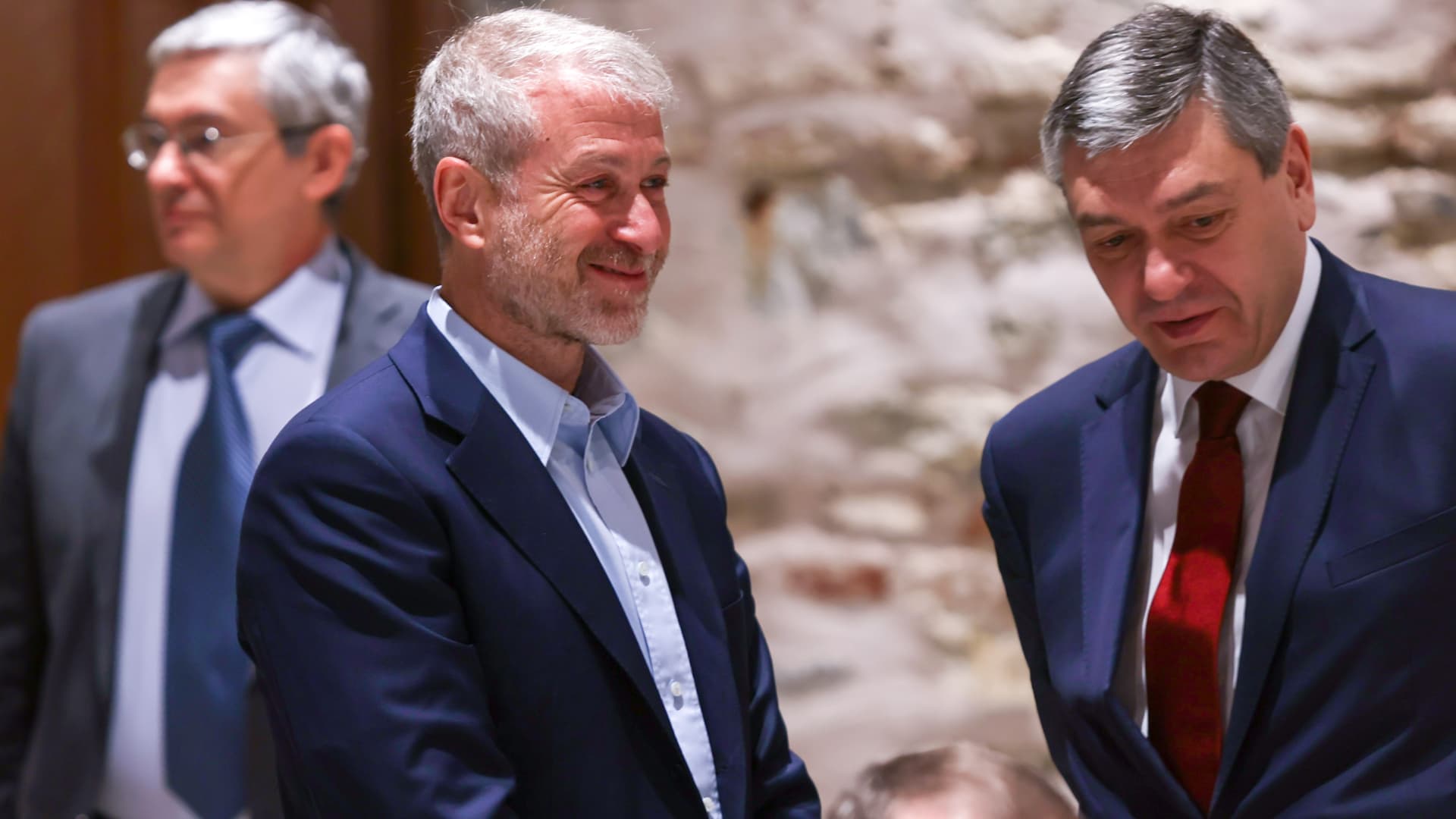بلينكن يصل إلى لاوس لحضور اجتماعات «آسيان» ولقاء نظيره الصيني
‘Under the counter diplomacy’: Why sanctioned oligarch Roman Abramovich is brokering peace in Ukraine

The attendance of billionaire Roman Abramovich (L) at Russia-Ukraine peace talks in Istanbul have left many questioning the intentions of the Russian oligarch.
Cem Ozdel | Anadolu Agency | Getty Images
As Russia-Ukraine talks resume on Friday, questions continue to abound over the peculiar involvement of Russian oligarch Roman Abramovich, and the role he might be playing in ongoing negotiations.
The sanctioned Chelsea soccer club owner was spotted at talks in Istanbul, Turkey, earlier this week, where he was photographed alongside mediating host President Recep Tayyip Erdogan and Turkish Foreign Minister Mevlut Cavusoglu.
Both Russian and Ukrainian spokespeople have said Abramovich is not an official member of their delegation, nor was he seated at the main negotiating table during talks.
Rather, he is considered a neutral party, having played an important role in facilitating talks. Indeed, Ukraine’s President Volodymyr Zelenskyy reportedly asked President Joe Biden to hold fire on sanctioning Abramovich as he could prove a useful go-between in brokering peace. A spokesperson for Abramovich was not immediately available for comment when contacted by CNBC.
However, it’s a curious position given the billionaire businessman’s alleged close ties to President Vladimir Putin, for which he has been sanctioned in the U.K. and EU.
Why Roman Abramovich?
Russian-born Abramovich is one of the world’s richest men, having derived much of his original wealth from the purchase (widely seen as being rigged) and later resale of state-owned oil company Sibneft following the collapse of the Soviet Union.
His intimate relations with the Kremlin are well established, having become a close ally to former President Boris Yeltsin in the 1990s and, later, Putin. However, he has kept largely under the radar of international politics over the years, preferring instead to focus on his overseas business dealings, including the 2003 purchase and transformation of London soccer club Chelsea F.C.
That was, until, Russia’s war in Ukraine threw the high-flying lifestyles of Russia’s oligarch elite firmly into the public eye as Western allies applied sanctions on Putin’s inner circle in a bid to pressure him into submission.
Abramovich is really a very convenient figure for Putin to use to engage in some kind of informal, under-the-counter diplomacy.
Andre Korobkov
professor, Middle Tennessee State University
Abramovich, for one, rose to prominence — not least for launching a fire sale of his most prized U.K. assets — but also following apparent requests by Ukraine to act as an intermediary between the West and Moscow.
“I can confirm that Roman Abramovich was contacted by the Ukrainian side for support in achieving a peaceful resolution, and that he has been trying to help ever since,” a spokesman for Abramovich said in late February, shortly after the war’s outbreak.
Abramovich, who is known to be a close contact of President Putin, was sanctioned by EU and U.K. authorities in March, causing his assets to be frozen and travel restricted.
Cem Ozdel | Anadolu Agency | Getty Images
He has since been seen traveling between Russia, Ukraine, Belarus and Israel to engage in mediation talks. But his motives remain unclear.
“As far as I am aware, he [Abramovich] was helping with the humanitarian issue: with the humanitarian convoy taking people out of Mariupol,” Zelenskyy told reporters on Sunday.
What is he seeking to achieve?
As an Israeli citizen and a Jew, some observers have suggested he is present in the interests of the Jewish community, which has a sizeable population across Ukraine and Russia.
Indeed, Israel has assumed a significant mediation role in ongoing peace talks and some analysts suggest Abramovich could be acting as a mouthpiece for the Israeli government, with whom he is known to have strong ties.
“Abramovich is the point guy on the ground to do what he can to advance the proposals and the mediation efforts that the Israeli Prime Minister has spearheaded,” Christopher Granville, managing director of EMEA & global political research at TS Lombard, told CNBC Thursday. Those aims include providing aid and stemming the growing migrant crisis.
The Jewish community was Abramovich’s entry into these discussions. But once you’re involved in mediation, you’re brought in fully.
Christopher Granville
managing director, TS Lombard
That, to Zelenskyy’s point, could have since extended into wider humanitarian efforts, including the establishment of safe exit corridors for civilians caught in the crossfire.
“The Jewish community was Abramovich’s entry into these discussions. But once you’re involved in mediation, you’re brought in fully to all lines of communication,” said Granville.
Others, however, suggest his presence may be much more strategically and politically significant, representing both presence on the ground for Putin and also an important go-between for all sides.
“Abramovich is really a very convenient figure for Putin to use to engage in some kind of informal, under-the-counter diplomacy,” said Andrei Korobkov, professor of political science and international relations at the Middle Tennessee State University.
“In reality, he serves as a link between the Kremlin, Zelenskyy, Israel, probably the U.S. and maybe even the U.K.,” said Korobkov, noting Abramovich’s “significant connections” in Britain even in the face of sanctions.
Still, some remain more skeptical over the oligarch’s intentions.
Ukraine’s U.K. ambassador, Vadym Prystaiko, who was in attendance at the meeting in Istanbul, told the BBC he had “no idea” why Abramovich was there, and questioned his motives.
“I don’t know if he’s buying his way out somehow or if he’s really useful, that’s very difficult to tell,” Prystaiko said.
Over the weekend, Erdogan and Cavusoglu both said they would welcome Russian oligarchs to Turkey, a non-EU country but a NATO member, which opposes sanctions out of principle. It came just days after Abramovich moved two of his superyachts and a private jet to the country, out of reach of European regulators.
